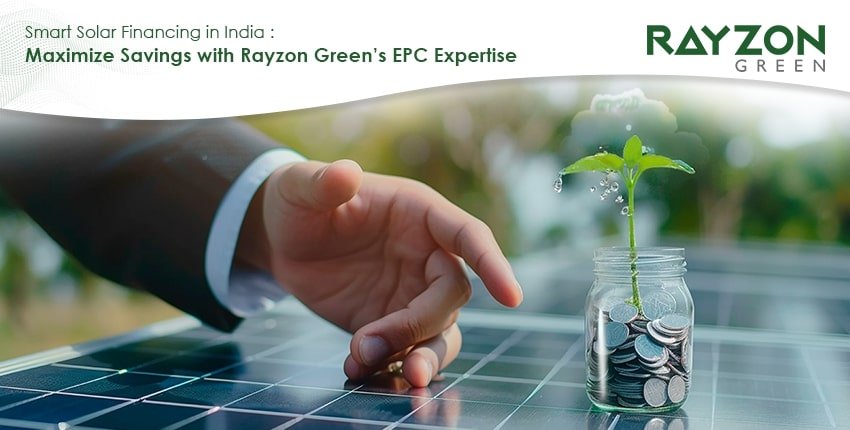
Solar energy has emerged as one of the most cost-effective and sustainable energy solutions in today’s world. With the rising demand for renewable energy, businesses and homeowners alike are exploring the potential of solar power to reduce electricity bills and achieve energy independence. However, the upfront costs of solar panel installation can be a barrier for many. This is where solar financing plays a crucial role in making solar energy accessible and affordable.
Understanding solar financing is essential to maximizing savings while transitioning to clean energy. From government incentives to various financing models, there are multiple ways to make solar power a viable investment. This blog explores the key aspects of solar financing, the role of top solar EPC companies in India, and how choosing the right financial strategy can ensure long-term benefits for businesses and homeowners.
Investing in solar energy requires a significant initial cost, but with the right financing options, individuals and businesses can leverage solar power without bearing the full financial burden upfront. Top solar EPC companies in India, like Rayzon Green, offer a range of solar financing solutions to make solar adoption seamless and cost-effective.
1. System Size and Energy Needs – The size of the solar power plant installation directly affects the overall cost and return on investment. A larger solar system requires more panels and infrastructure, which increases the initial investment but also yields higher energy savings. Businesses with high energy consumption, such as manufacturing plants or large commercial spaces, may need a more extensive solar setup compared to residential properties. Understanding energy needs is crucial for determining the right financing plan that ensures an optimal payback period.
2. Location and Sunlight Availability – The geographic location of a solar installation impacts its efficiency. Areas with higher solar irradiation generate more electricity, leading to faster financial returns. India, for example, has regions that receive abundant sunlight throughout the year, making solar power a viable energy source. Proper site assessment and planning by solar energy consultants in India ensure that the solar panels are positioned for maximum sunlight exposure, further reducing the time required to recover costs.
3. Government Incentives and Subsidies – Various policies and rebates lower the overall cost of installing solar energy systems. The Indian government has introduced several schemes to encourage solar adoption, such as net metering, capital subsidies, and incentives for residential and industrial users. These incentives help in reducing upfront costs and making solar installations more financially feasible. Solar EPC contractors assist businesses and homeowners in applying for these benefits, ensuring they maximize their savings.
4. Financing Options – Choosing between loans, leasing, power purchase agreements (PPAs), and direct purchases impacts long-term savings. Each financing model has its advantages and suits different financial needs. For instance, a direct purchase offers the highest long-term savings, while leasing or PPAs are ideal for those who do not want the burden of ownership. Learn more about how solar EPC can support net-zero goals.
5. Solar Panel Installation Cost in India – The cost of solar systems varies based on installation, labor, and material expenses. Factors such as panel efficiency, inverter technology, and mounting structures influence the final pricing. Solar installation companies offer customized solutions based on budget and energy requirements to optimize cost-effectiveness.
Solar loans function similarly to home improvement loans, allowing individuals and businesses to own their solar systems while paying in installments. They provide an opportunity to benefit from tax credits, rebates, and long-term electricity savings. Solar loans can be secured or unsecured, with varying interest rates based on credit scores and repayment terms.
Pros:
Cons:
With a solar lease, homeowners or businesses can install a solar energy system without upfront costs. Instead, they pay a fixed monthly amount for using the solar energy generated by the system. The leasing company owns and maintains the system, providing an easy and low-risk way to benefit from solar power.
Pros:
Cons:
A Power Purchase Agreement (PPA) allows businesses to install solar panels without ownership. Instead, they pay for the electricity generated at a predetermined rate, usually lower than conventional electricity rates. PPAs are ideal for businesses looking to reduce operational costs without capital investment.
Pros:
Cons:
Governments across the globe are offering subsidies to promote solar energy adoption. In India, various solar EPC services help customers leverage solar energy solutions through state and central government schemes.
When selecting a solar installation company in India, it’s essential to choose a reliable partner. Rayzon Green, one of the best solar EPC companies, ensures efficient project execution—from design and financing to installation and maintenance.
Switching to solar energy is a financially rewarding decision, but understanding solar financing is key to maximizing savings. Whether through solar loans, leases, or PPAs, businesses and homeowners can leverage various financing options to make solar energy more affordable. Top solar EPC companies in India, like Rayzon Green, provide tailored financing solutions to ensure customers get the best return on investment.
By choosing the right solar EPC services and utilizing government incentives, individuals and companies can significantly reduce their electricity expenses and contribute to a sustainable future. Investing in solar panel installation companies not only offers cost savings but also promotes energy independence.
Are you ready to make the switch to solar energy and enjoy long-term savings? Partner with Rayzon Green, the best solar EPC company, to find the perfect solar financing option for your needs. Contact us today for expert consultation and customized solar power solutions for industries. Start your journey towards energy independence and sustainability now!